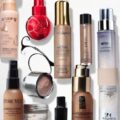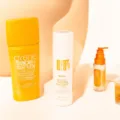Myth 1: All SPFs Are Created Equal
Many people believe that as long as a sunscreen is labeled ‘SPF 30’ or higher, it will provide adequate sun protection. However, this is not the case. When choosing a sunscreen, it’s important to consider the type of UV filters used and how well the formula protects against both UVA and UVB rays.
The Truth
Not all SPFs provide equal protection. When shopping for sunscreen, look for a ‘broad spectrum’ label, indicating that the formula defends against both UVA rays (which cause skin aging) and UVB rays (which burn the skin). Also aim for an SPF of at least 30, which blocks 97% of the sun’s UVB rays.
Myth 2: You Only Need Sunscreen When at the Pool or Beach
It’s easy to think you only need sun protection when actively spending time in the sun at the pool or beach. But incidental sun exposure, like walking from your car into work, also contributes to skin damage over time.
The Truth
You need daily sun protection, even on cloudy days or in cold weather. Apply an SPF moisturizer or foundation with SPF to your face whenever you head outside to defend against incidental sun exposure.
Myth 3: There’s No Point in Using Sunscreen with Makeup On
Some assume that makeup with SPF can replace sunscreen, while others think sunscreen is pointless over makeup. In reality, neither offers optimal protection alone.
The Truth
Always apply sunscreen first, then makeup. This ensures your skin is fully protected. Look for makeup products with mineral-based SPF for extra defense against sun damage.
FAQ
What kind of sunscreen is best?
The most protective sunscreens use mineral filters like zinc oxide and titanium dioxide, which physically deflect UV rays. They typically provide broader spectrum protection compared to chemical filters.
How should you apply sunscreen?
Use about 1 ounce to cover your whole body, reapplying every 2 hours. Pay extra attention to commonly missed spots like ears, scalp, lips, and tops of feet.
Can you get enough vitamin D if you always wear sunscreen?
Yes. The small amount of sun exposure you get doing everyday activities with proper SPF use allows enough vitamin D production.
Is spray or lotion sunscreen better?
Lotions provide thicker coverage with less room for user error. But sprays are convenient for full body application. Whichever you choose, apply thoroughly and reapply often.
What is SPF clothing?
SPF clothing has UV protection built into the fabric. It provides an additional layer of defense, but does not replace body sunscreens which ensure comprehensive protection.









